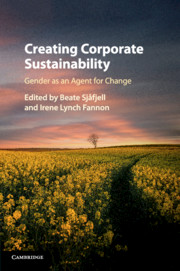Book contents
- Creating Corporate Sustainability
- Creating Corporate Sustainability
- Copyright page
- Dedication
- Contents
- Contributors
- Foreword
- Preface
- 1 Corporations, Sustainability and Women
- Part I Women as Influencers of Corporate Action
- Part II Current Strategies for Corporate Sustainability
- 5 Company Reporting of Environmental, Social and Gender Matters
- 6 ‘A Toad We Have to Swallow’
- 7 Gender Diversity on Corporate Boards
- 8 Social Entrepreneurship: (The Challenge for) Women as Economic Actors?
- 9 How Change Happens
- Part III Feminist Theories and Corporate Sustainability
- Index
5 - Company Reporting of Environmental, Social and Gender Matters
Limitations, Barriers and Changing Paradigms
from Part II - Current Strategies for Corporate Sustainability
Published online by Cambridge University Press: 14 May 2018
- Creating Corporate Sustainability
- Creating Corporate Sustainability
- Copyright page
- Dedication
- Contents
- Contributors
- Foreword
- Preface
- 1 Corporations, Sustainability and Women
- Part I Women as Influencers of Corporate Action
- Part II Current Strategies for Corporate Sustainability
- 5 Company Reporting of Environmental, Social and Gender Matters
- 6 ‘A Toad We Have to Swallow’
- 7 Gender Diversity on Corporate Boards
- 8 Social Entrepreneurship: (The Challenge for) Women as Economic Actors?
- 9 How Change Happens
- Part III Feminist Theories and Corporate Sustainability
- Index
Summary
- Type
- Chapter
- Information
- Creating Corporate SustainabilityGender as an Agent for Change, pp. 91 - 113Publisher: Cambridge University PressPrint publication year: 2018



